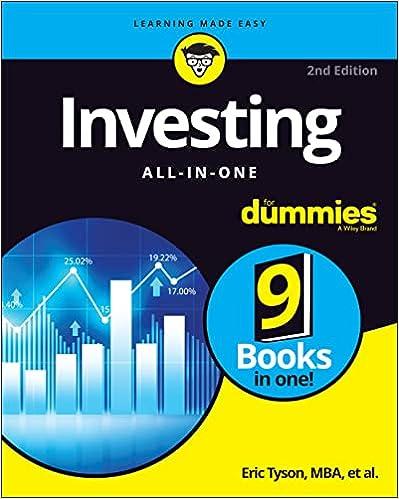Question
I am working on practice homework problems and am having issues knowing if I am calculating things correctly. Any help on clarification with these questions
I am working on practice homework problems and am having issues knowing if I am calculating things correctly. Any help on clarification with these questions would be a huge help!
1) You have applied for an $180,000 mortgage to buy your first house. The bank is offering you a 30-year loan at 4.25 percent interest.
a) What is the monthly payment on this loan?
$885.49
b) If you continue to make this payment for 7 years, how much will you owe on this loan?
$155,787.69
c) Suppose instead of the scheduled monthly payment calculated in (a) above, you make payments of $1,000 per month. How long will it take you to pay off the loan?
11.62 years
2) Consider an investment that will pay you $1,000 each year for five years. After that, the payment will grow by 3 percent per year indefinitely, so that the payment in year 6 will be $1,030, the payment in year 7 will be $1,060.90, and so forth.
a) If your required rate of return on this investment is 13 percent, what is the most youd be willing to pay for it?
b) If the investment costs you $8,000 today, what is its net present value?
3) Rich is evaluating an investment that will provide the following returns at the end of each of the following years:
Years 1-3: $14,000 Years 4-5: $0 Years 6-10: $20,000
Rich believes he should earn an annual return of 8 percent on this investment. How much should he be willing to pay for this investment?
Approximately $90,426.79
4) Consider an investment that will pay you $3,000 per month for each of the next 3 years, and then $5,000 per month in the following 5 years.
a) If your required rate of return on this investment is 18 percent per year, what is the most you would be willing to pay for it?
NOTE: Your cash flow worksheet does NOT incorporate the P/Y setting. Thus, you must use periodicinterest rates when calculating the NPV with irregular cash flows.
b) Suppose you can purchase this investment for $150,000. What is its net present value? Should you purchase this investment?
Step by Step Solution
There are 3 Steps involved in it
Step: 1

Get Instant Access to Expert-Tailored Solutions
See step-by-step solutions with expert insights and AI powered tools for academic success
Step: 2

Step: 3

Ace Your Homework with AI
Get the answers you need in no time with our AI-driven, step-by-step assistance
Get Started


